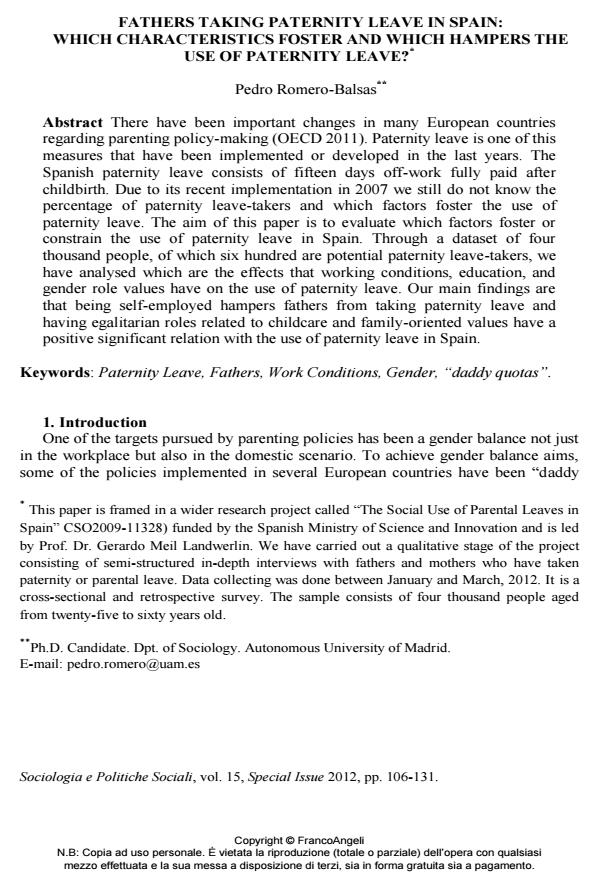Fathers taking paternity leave in spain: which characteristics foster and which hampers the use of paternity leave?
Titolo Rivista SOCIOLOGIA E POLITICHE SOCIALI
Autori/Curatori Pedro Romero-Balsas
Anno di pubblicazione 2013 Fascicolo 2012/Suppl. 3
Lingua Inglese Numero pagine 26 P. 106-131 Dimensione file 527 KB
DOI 10.3280/SP2012-SU3006
Il DOI è il codice a barre della proprietà intellettuale: per saperne di più
clicca qui
Qui sotto puoi vedere in anteprima la prima pagina di questo articolo.
Se questo articolo ti interessa, lo puoi acquistare (e scaricare in formato pdf) seguendo le facili indicazioni per acquistare il download credit. Acquista Download Credits per scaricare questo Articolo in formato PDF

FrancoAngeli è membro della Publishers International Linking Association, Inc (PILA)associazione indipendente e non profit per facilitare (attraverso i servizi tecnologici implementati da CrossRef.org) l’accesso degli studiosi ai contenuti digitali nelle pubblicazioni professionali e scientifiche
There have been important changes in many European countries regarding parenting policy-making (OECD 2011). Paternity leave is one of this measures that have been implemented or developed in the last years. The Spanish paternity leave consists of fifteen days off-work fully paid after childbirth. Due to its recent implementation in 2007 we still do not know the percentage of paternity leave-takers and which factors foster the use of paternity leave. The aim of this paper is to evaluate which factors foster or constrain the use of paternity leave in Spain. Through a dataset of four thousand people, of which six hundred are potential paternity leave-takers, we have analysed which are the effects that working conditions, education, and gender role values have on the use of paternity leave. Our main findings are that being self-employed hampers fathers from taking paternity leave and having egalitarian roles related to childcare and family-oriented values have a positive significant relation with the use of paternity leave in Spain.
Parole chiave:Paternity Leave, Fathers, Work Conditions, Gender, "daddy quotas".
- Comparación del impacto de los valores de género en el trabajo no remunerado en dos tipos de Estado del Bienestar: Reino Unido y España Pedro Romero-Balsas, Margaret O’Brien, Concepción Castrillo Bustamante, in Revista Internacional de Sociología /2020 pp.e154
DOI: 10.3989/ris.2020.78.2.18.160 - Des pères absents ? Saisir la diversité du non-recours au congé de paternité à partir de méthodes mixtes Alix Sponton, in Population /2023 pp.87
DOI: 10.3917/popu.2301.0087 - Constructing fatherhood in the North and South: Paid parental leave, work and care in Iceland and Spain Ásdís A Arnalds, Sabina Belope-Nguema, Guðný Björk Eydal, José Andrés Fernández-Cornejo, in Acta Sociologica /2022 pp.86
DOI: 10.1177/00016993211008517 - Des pères « en solitaire » ? pp.193 (ISBN:9791032000540)
- Handbook of Research on Promoting an Inclusive Organizational Culture for Entrepreneurial Sustainability Ryan Payne, Jennifer Kruwinnus, Deanna Grant-Smith, pp.86 (ISBN:9781668452165)
- ¿Iguales e intransferibles? Preferencias por el sistema de permisos por nacimiento Julia Cañero Ruiz, Danislava Marinova, in Revista Española de Investigaciones Sociológicas /2025 pp.63
DOI: 10.5477/cis/reis.190.63-88 - Why Is Part-time Unpaid Parental Leave (Still) Gendered? Narratives and Strategies of Couples in Spain Xiana Bueno, Marc Grau-Grau, in Journal of Family Issues /2021 pp.503
DOI: 10.1177/0192513X20918286 - The Palgrave Handbook of Family Policy Rense Nieuwenhuis, pp.657 (ISBN:978-3-030-54617-5)
- The Use of Paternity Leave by Migrants in Spain Pedro Romero-Balsas, Gerardo Meil, Jesús Rogero-García, in Social Policy and Society /2025 pp.1
DOI: 10.1017/S1474746425101085
Pedro Romero-Balsas, Fathers taking paternity leave in spain: which characteristics foster and which hampers the use of paternity leave? in "SOCIOLOGIA E POLITICHE SOCIALI" Suppl. 3/2012, pp 106-131, DOI: 10.3280/SP2012-SU3006